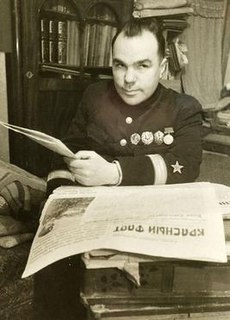This page is based on this
Wikipedia article Text is available under the
CC BY-SA 4.0 license; additional terms may apply.
Images, videos and audio are available under their respective licenses.
Sergei Sergeyevich Brukhonenko was a Soviet biomedical scientist and technologist during the Stalinist era. Brukhonenko's research was vital to the development of open-heart procedures in Russia. He was one of the leaders of the Research Institute of Experimental Surgery, where Professor Alexander Vishnevsky performed the first Soviet open-heart operation in 1957.
The Russian All-Military Union is an organization that was founded by White Army General Pyotr Wrangel in the Kingdom of Serbs, Croats and Slovenes on 1 September 1924, initially headquartered in the town of Sremski Karlovci. The organization′s ostensible purpose was provision of aid to the veterans of the Russian White movement, soldiers and officers alike, who now lived outside the USSR; the undeclared aim was to maintain a Russian military organisation with a view to fighting the Bolsheviks.

Vitaly Viktorovich Vishnevskiy is a Russian former professional ice hockey defenceman. He previously played in the National Hockey League for the Mighty Ducks of Anaheim, Atlanta Thrashers, Nashville Predators, and New Jersey Devils, as well as for Lokomotiv Yaroslavl, SKA St. Petersburg and Severstal Cherepovets in the KHL.

The Chekhov Gymnasium in Taganrog on Ulitsa Oktyabrskaya 9 is the oldest gymnasium in the South of Russia. Playwright and short-story writer Anton Chekhov spent 11 years in the school, which was later named after him and transformed into a literary museum. Visitors can see Anton's desk and his classroom, the assembly hall and even the punishment cell which he sometimes visited.
Vishnevsky or Vishnevskaya is the Russian surname of the Polish equivalent Wiśniewski, which may refer to:

Vsevolod Vitalievich Vishnevsky was a Soviet dramatist and prose writer.
Procaine blockade is a medical treatment, where procaine solution affects the peripheral nervous system. Procaine blockade was developed by Aleksandr Vasilyevich Vishnevsky in 1929. There are lumbar, jugular, sacral, extremity and short neural blockades used.

Optimistic Tragedy is a 1963 Soviet film directed by Samson Samsonov. It is based on the eponymous play by Vsevolod Vishnevsky and was entered into the 1963 Cannes Film Festival.

Alexander Saidgereyevich Galimov was a Russian professional ice hockey player. At the time of his death, he was a member of Lokomotiv Yaroslavl of the Kontinental Hockey League (KHL) whose team plane crashed on 7 September 2011 killing all but one of the 45 crew and passengers on board.

Alisa Georgyevna Koonen, also known as Alice Coonen, was a Russian and Soviet actress and the wife of the director Alexander Tairov.

The Kamerny Theatre was a chamber theatre in Moscow, founded in 1914 by director Alexander Tairov (1885–1950). Over the next 35 years, this small, intimate theater became "recognized as a major force in Russian theater". Considered among the better presentations staged at the theater were: Princess Brambilla (1920), Phèdre and Giroflé-Girofla (1922), Desire Under the Elms (1926), Day and Night (1926), The Negro (1929), The Beggars' Opera (1930) and Vishnevsky's An Optimistic Tragedy (1933). Tairov's primary collaborator in building the sets was Aleksandra Ekster, and these were based upon the period's constructivist style. The decor for the theatre was designed by Konstantin Medunetsky.
Boris Khodorov was a Soviet and Russian physiologist, M.D., D.Sc., Professor of Physiology, and Head of the Cell Physiology section of Moscow Physiological Society.

The Unforgettable Year 1919 is a 1951 Soviet biopic directed by Mikheil Chiaureli. It is considered an important representation of Joseph Stalin's cult of personality.
Alexander Nikolaevich Kolminov, PAU, was a Soviet and Russian composer.

Sergey Vasilyevich Aydarov was a Russian and Soviet stage actor and theatre director, associated with the Moscow's Maly Theatre where he debuted in 1898. His most acclaimed parts were those in the plays by Alexander Ostrovsky, as well in Julius Caesar and The Tempest by William Shakespeare.

Vishnevsky liniment or balsamic liniment is a topical medication which has been used to treat wounds, burns, skin ulcers and suppurations. Developed by Russian surgeon Alexander Vishnevsky in 1927, the liniment contains birch tar, xeroformium and castor oil which have been broadly used as a topical medication in the former Soviet Union.












